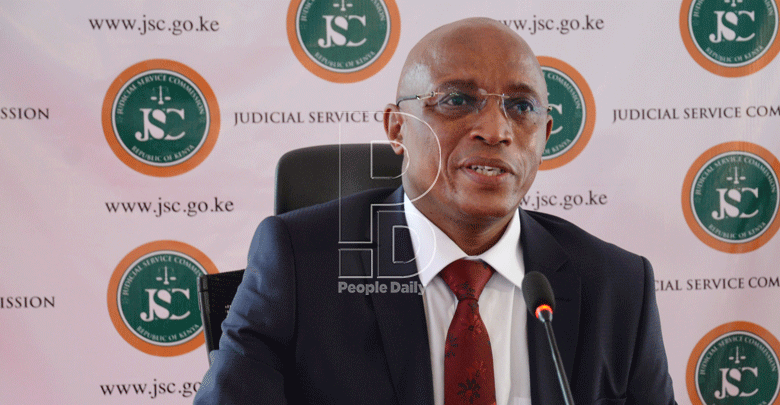Labour court judge Nderi defends teachers pay ruling

Employment and Labour Relations court judge Nduma Nderi yesterday defended his decision to award teachers 50 to 60 per cent pay increase in 2015, saying his decision helped stop the numerous strikes by teachers.
Justice Nderi who was being interviewed for the Chief Justice position by a panel of nine Judicial Service Commission members said his decision only implemented what had been negotiated and agreed by the parties before Salaries and Remuneration Commission stepped in.
Nderi said there was compelling evidence from the workers who were the teachers, that they were earning from Sh15,000 a month with majority of them not belonging to Sh30,000 bracket.
“I believe were it not for that decision the situation of teachers would not have changed. Today all teachers got between 50-60 per cent pay rise which is what I had initially ruled,” he told the commission.
Commissioner Macharia Njeru raised concerns regarding the ruling arguing that the judge ignored the effects that the verdict might have caused, especially an economic one.
Economy experts
According to the commissioner, the evidence adduced in court by economy experts stated that if the award the teachers were asking for at the time was given, the implication would be so big it would affect the country’s wage bill and would end up being 95.5 per cent out of our domestic revenue.
“Despite all the evidence that was submitted by all these economist and specialists you still ignored all that and went ahead and gave 50 to 60 percent award, notwithstanding all the implication and there was no budget for it.
You were even told you were taking over the work of five other institutions; SRC, TSC, Controller of Budget, Parliament and the National Treasury.
If you became the Chief Justice and you’re not looking at the bigger picture, how would that work?” he asked.
Justice Nderi however responded that his decision helped stop the many strikes happening every beginning of the year despite the decision being overturned by Court of Appeal.
“SRC engaged into negotiations which have resulted in salary increment in the same line I had ruled…In fact ,I believe until today, were it not for my decision ,the situation of teachers would never have changed,” he told the Commissioners.
“Even before the matter was over at the Court of Appeal, they had already started implementing and all teachers got between 50 to 60 percent salary increment and there has never been a major strike by the teachers since then and that was my focus because the children and the parents had suffered so much.
Every beginning of the year there was a strike notice for a long period, those are things I took into consideration,” he added.
The Judge noted that when the matter went to the court of appeal it was handled by a bench that had commissioner Mohammed Warsame as a judge of appeal and the three judge bench at the interim stage upheld his decision and ordered the decision to be implemented.
“A five judge bench was later constituted to counter the decision by Justice Warsame’s Bench which overturned my decision. Even at that stage there was no unanimity on the matter.
The government itself implemented the same terms if not better,” he told the Commission.
On the issue of unconfirmed 41 judges, Justice Nderi posited himself as the person to unlock the stalemate saying he has done a lot of consensus-building and he would deal with the matter using his negotiations skills.
“Heads of state are too busy to deal with issues that have not been narrowed down.
I will engage some of the most senior officials even in this Commission to help us unlock the stalemate,” he said.
On the issue of independence of the Judiciary, the Judge noted that the three arms of government are inter-dependent and are borne of the people and thus the authority in all those three arms of government come from the people.
“These are areas of commonality and therefore, when the decisions of the court issued fairly and justly whether you agree with them or not as an executive please obey them and appeal.”
Court decision anarchy
The Judge noted that the continued disregard of the court decision eventually lead to anarchy which comes slowly without knocking the door. “Issues of financial independence of the judiciary, the parliament is there to facilitate this institution to foster it’s independence and service to the people and that is why the interaction between the CJ, speakers of both houses and the President are key,” he said.
On the issue of corruption in the Judiciary, the Judge noted that the perception that the Judiciary was very corrupt was wrong though even the one per cent of corruption in the Judiciary was unacceptable.
“A survey report paint a totally different picture saying 70 per cent of people are happy with the fight against corruption by the Judiciary,” he told the panel.
According to the judge he would use radio as a medium to communicate with Kenyans and create awareness.










